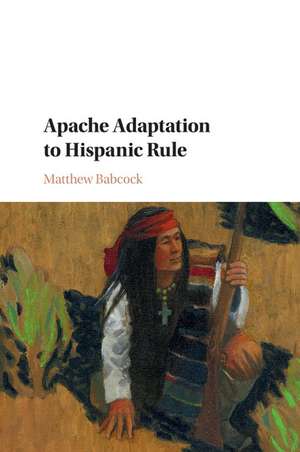Apache Adaptation to Hispanic Rule: Studies in North American Indian History
Autor Matthew Babcocken Limba Engleză Paperback – 28 mar 2018
| Toate formatele și edițiile | Preț | Express |
|---|---|---|
| Paperback (1) | 230.95 lei 3-5 săpt. | +17.95 lei 6-12 zile |
| Cambridge University Press – 28 mar 2018 | 230.95 lei 3-5 săpt. | +17.95 lei 6-12 zile |
| Hardback (1) | 437.29 lei 3-5 săpt. | |
| Cambridge University Press – 25 sep 2016 | 437.29 lei 3-5 săpt. |
Preț: 230.95 lei
Nou
Puncte Express: 346
Preț estimativ în valută:
44.19€ • 47.26$ • 36.85£
44.19€ • 47.26$ • 36.85£
Carte disponibilă
Livrare economică 28 martie-11 aprilie
Livrare express 13-19 martie pentru 27.94 lei
Preluare comenzi: 021 569.72.76
Specificații
ISBN-13: 9781107547322
ISBN-10: 1107547326
Pagini: 317
Ilustrații: 5 b/w illus. 10 maps 3 tables
Dimensiuni: 152 x 229 x 18 mm
Greutate: 0.47 kg
Editura: Cambridge University Press
Colecția Cambridge University Press
Seria Studies in North American Indian History
Locul publicării:New York, United States
ISBN-10: 1107547326
Pagini: 317
Ilustrații: 5 b/w illus. 10 maps 3 tables
Dimensiuni: 152 x 229 x 18 mm
Greutate: 0.47 kg
Editura: Cambridge University Press
Colecția Cambridge University Press
Seria Studies in North American Indian History
Locul publicării:New York, United States
Cuprins
Introduction; 1. Peace and war; 2. Precedents; 3. Ambivalent compromise; 4. Acculturation and adaptation; 5. Collapse and independence; 6. Resilience and survival; 7. Epilogue; Appendix; Bibliography; Index.
Recenzii
'Deeply researched and lucidly argued, Matthew Babcock's Apache Adaptation to Hispanic Rule casts fresh light on an important, if long-ignored, aspect of borderlands and Apache history: the establecimientos de paz of the late Spanish and early Mexican era.' Karl Jacoby, Columbia University, New York, and author of Shadows at Dawn: A Borderlands Massacre and the Violence of History
'Apaches de paz creates a culturally sensitive framework for the history of the Ndé people in northern Mexico and southwestern US. Focused on the late eighteenth-century reserves that were established by Spanish colonial policy but shaped by the different Athapaskan bands who settled in them while maintaining their ethnic territories; this well-researched study opens new interpretations for the complexity of inter-ethnic relations in these borderlands.' Cynthia Radding, University of North Carolina, Chapel Hill
'Generations before the US built its notorious reservation system, Spain created its own military-run reservations in an effort to dominate and transform Apaches. That effort failed in a most interesting way. As Matthew Babcock explains in this prodigiously researched and judiciously argued book, negotiation always trumped domination, and the transformations went both ways.' Brian DeLay, University of California, Berkeley
'An excellent summary of the Hispanic reservation system that will appeal to area specialists and to general readers interested in Apache and Borderlands history. It should prove especially useful for comparative studies with the later reservation policies implemented by the United States.' Mark Santiago, Western Historical Quarterly
'Unlike most scholarship on the Apaches, Babcock's focus is not so much on violence and warfare as on diplomacy and peace. His study is also significant for its inclusion not just of the well-known Chiricahuas, but also the Western, Mescalero, and Lipan Apaches. … This book is thoroughly researched and well written, and its arguments are cogently presented. Its broad chronological and topical scope will appeal to ethnohistorians and borderlands scholars, as well as those with an interest in colonial New Spain, the U.S. Southwest, Native American history, and the evolution of Indian policy. Readers will come away with a deeper, more nuanced understanding of the colonial events leading up to the resistance of famous nineteenth-century Apache figures like Mangas Coloradas, Cochise, Victorio, and Geronimo.' William S. Kiser, The American Historical Review
'… Babcock's thoroughly documented, clearly written, and cogently argued essay is a mandatory reference for specialists, and highly recommended for scholars and educated readers interested in the US - Mexico borderlands as well as Native American, western US, and colonial Latin American history. It can also be profitably used to teach undergraduates.' Joaquín Rivaya-Martínez, Southwestern Historical Quarterly
'Apaches de paz creates a culturally sensitive framework for the history of the Ndé people in northern Mexico and southwestern US. Focused on the late eighteenth-century reserves that were established by Spanish colonial policy but shaped by the different Athapaskan bands who settled in them while maintaining their ethnic territories; this well-researched study opens new interpretations for the complexity of inter-ethnic relations in these borderlands.' Cynthia Radding, University of North Carolina, Chapel Hill
'Generations before the US built its notorious reservation system, Spain created its own military-run reservations in an effort to dominate and transform Apaches. That effort failed in a most interesting way. As Matthew Babcock explains in this prodigiously researched and judiciously argued book, negotiation always trumped domination, and the transformations went both ways.' Brian DeLay, University of California, Berkeley
'An excellent summary of the Hispanic reservation system that will appeal to area specialists and to general readers interested in Apache and Borderlands history. It should prove especially useful for comparative studies with the later reservation policies implemented by the United States.' Mark Santiago, Western Historical Quarterly
'Unlike most scholarship on the Apaches, Babcock's focus is not so much on violence and warfare as on diplomacy and peace. His study is also significant for its inclusion not just of the well-known Chiricahuas, but also the Western, Mescalero, and Lipan Apaches. … This book is thoroughly researched and well written, and its arguments are cogently presented. Its broad chronological and topical scope will appeal to ethnohistorians and borderlands scholars, as well as those with an interest in colonial New Spain, the U.S. Southwest, Native American history, and the evolution of Indian policy. Readers will come away with a deeper, more nuanced understanding of the colonial events leading up to the resistance of famous nineteenth-century Apache figures like Mangas Coloradas, Cochise, Victorio, and Geronimo.' William S. Kiser, The American Historical Review
'… Babcock's thoroughly documented, clearly written, and cogently argued essay is a mandatory reference for specialists, and highly recommended for scholars and educated readers interested in the US - Mexico borderlands as well as Native American, western US, and colonial Latin American history. It can also be profitably used to teach undergraduates.' Joaquín Rivaya-Martínez, Southwestern Historical Quarterly
Notă biografică
Descriere
This book reinterprets Southwestern history before the US-Mexican War through a case study of the poorly understood Apaches de paz and their adaptation to Hispanic rule.



























